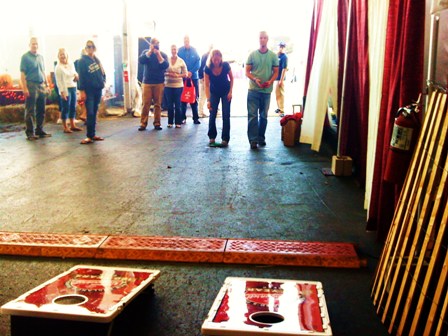A few years ago our VP Marketing/Sales, Jim Crooks, ordered some bean bag toss games from a company called Baggo. You can actually purchase one on our webstore here. When it arrived we all pulled it out and started tossing bean bags around the shop all afternoon. What was it for? Jim thought it was going to be the next big bar game especially at the beach bars down in Narragansett, Matunuck and Misquamicut. Word spread fast and Block Island obviously started playing and even some bars with outdoor areas in Providence took some. Now it's literally everywhere. You may have been to some events like BeerFest or Newport Oktoberfest and tossed a few in hopes of winning a Gansett t-shirt. Like the above photo. But these games are all the rage now at bars throughout the US. It's fun, super easy and safe to play. In fact, here's a great article from The Boston Globe's Lifestyle section on the game becoming popular in Boston.
Throw down! How bag toss became the next big bar game
By Luke O’Neil
Globe Correspondent / November 9, 2010
It’s opening night for the Celtics, and the game is on dozens of screens in the lower level of Lansdowne Street bar Game On! There’s a sense of excitement and competition in the air, and the crowd of a hundred or so is cheering loudly ’ but not because of the C’s.
All eyes are on the beanbags that are flying through the air and landing with solid thwacks on wooden targets. Teammates playfully talk trash to one another and hand out high-fives for scoring tosses. The following night a similar scenario will play out across town at Clerys in the South End, and, on other nights, at pubs like Bleacher Bar and the Green Briar.
Foosball, darts, and trivia nights have long been mainstays of the local bar scene, but the deceptively simple and addictive bean bag toss is becoming a favorite at pubs around the city, not to mention in backyards and tailgate parties.
The game, also known as cornhole, is roughly equivalent to horseshoes, pitting two teams of two against one another in a competition to 21 points. Points are scored by tossing cotton bags filled with corn at target holes cut into angled wooden platforms placed 20 to 27 feet apart. The American Cornhole Association outlines the specific dimensions for officially sanctioned play, but occasionally at indoor tournaments one makes do with the limited indoor space. Bags that are successfully tossed into the target hole are worth three points; those that land on the platform are worth one.
While the number of players around the country is difficult to pinpoint, says Mike Whitton of the ACA, his group claims some 30,000 members and climbing. Their website www.playcornhole.org has 725 tournaments listed this year alone. "On any single weekend during the season there could be 100,000 players partici pating,’’ he estimates.
The reason for the game’s growing popularity? Because it’s so easy to learn, says Social Boston Sports co-founder Brian Shaw. He was organizing the flow of the 40 teams competing on eight different courts set up on the multitiered floor space at Game On! The league play at the bar includes seven weeks of competition.
"Look around,’’ Shaw says. "Everyone is holding a beer. You don’t need a whole lot of athleticism to play, or to even be good. It’s a social game, it’s not aggressive.’’
Peter Coumounduros, the Massachusetts rep of the Cornhole Game Association, which organizes games around the Reading area, agrees.
"The appeal is you can play very competitively with other adults in any number of settings ’ beach, backyard, block parties, or in a low-key environment with family and kids,’’ he says.
Unlike horseshoes or lawn darts, which have the potential for injury, cornhole is fairly harmless and can be played almost anywhere. "I’ve yet to see anyone get hurt by a beanbag,’’ Coumounduros says. "It’s easy to set up, easy to move around, easy to pick up and get used to the game. And if you’re short on players, you can pull in one of your kids.’’


